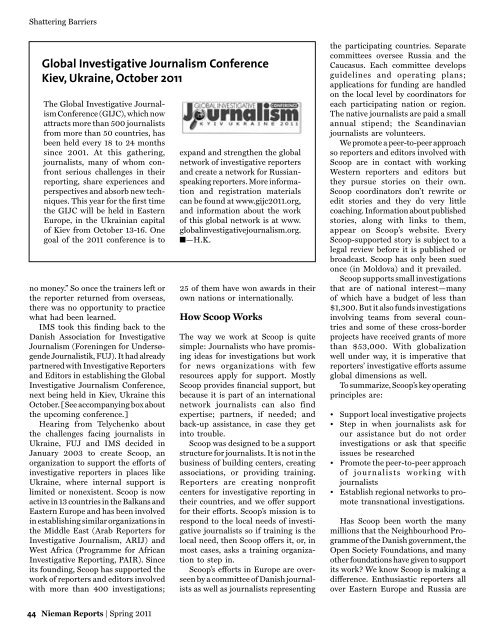N ieman Reports - Nieman Foundation - Harvard University
N ieman Reports - Nieman Foundation - Harvard University
N ieman Reports - Nieman Foundation - Harvard University
Create successful ePaper yourself
Turn your PDF publications into a flip-book with our unique Google optimized e-Paper software.
Shattering Barriers<br />
Global Investigative Journalism Conference<br />
Kiev, Ukraine, October 2011<br />
The Global Investigative Journalism<br />
Conference (GIJC), which now<br />
attracts more than 500 journalists<br />
from more than 50 countries, has<br />
been held every 18 to 24 months<br />
since 2001. At this gathering,<br />
journalists, many of whom confront<br />
serious challenges in their<br />
reporting, share experiences and<br />
perspectives and absorb new techniques.<br />
This year for the first time<br />
the GIJC will be held in Eastern<br />
Europe, in the Ukrainian capital<br />
of Kiev from October 13-16. One<br />
goal of the 2011 conference is to<br />
no money.” So once the trainers left or<br />
the reporter returned from overseas,<br />
there was no opportunity to practice<br />
what had been learned.<br />
IMS took this finding back to the<br />
Danish Association for Investigative<br />
Journalism (Foreningen for Undersøgende<br />
Journalistik, FUJ). It had already<br />
partnered with Investigative Reporters<br />
and Editors in establishing the Global<br />
Investigative Journalism Conference,<br />
next being held in Kiev, Ukraine this<br />
October. [See accompanying box about<br />
the upcoming conference.]<br />
Hearing from Telychenko about<br />
the challenges facing journalists in<br />
Ukraine, FUJ and IMS decided in<br />
January 2003 to create Scoop, an<br />
organization to support the efforts of<br />
investigative reporters in places like<br />
Ukraine, where internal support is<br />
limited or nonexistent. Scoop is now<br />
active in 13 countries in the Balkans and<br />
Eastern Europe and has been involved<br />
in establishing similar organizations in<br />
the Middle East (Arab Reporters for<br />
Investigative Journalism, ARIJ) and<br />
West Africa (Programme for African<br />
Investigative Reporting, PAIR). Since<br />
its founding, Scoop has supported the<br />
work of reporters and editors involved<br />
with more than 400 investigations;<br />
expand and strengthen the global<br />
network of investigative reporters<br />
and create a network for Russianspeaking<br />
reporters. More information<br />
and registration materials<br />
can be found at www.gijc2011.org,<br />
and information about the work<br />
of this global network is at www.<br />
globalinvestigativejournalism.org.<br />
—H.K.<br />
25 of them have won awards in their<br />
own nations or internationally.<br />
How Scoop Works<br />
The way we work at Scoop is quite<br />
simple: Journalists who have promising<br />
ideas for investigations but work<br />
for news organizations with few<br />
resources apply for support. Mostly<br />
Scoop provides financial support, but<br />
because it is part of an international<br />
network journalists can also find<br />
expertise; partners, if needed; and<br />
back-up assistance, in case they get<br />
into trouble.<br />
Scoop was designed to be a support<br />
structure for journalists. It is not in the<br />
business of building centers, creating<br />
associations, or providing training.<br />
Reporters are creating nonprofit<br />
centers for investigative reporting in<br />
their countries, and we offer support<br />
for their efforts. Scoop’s mission is to<br />
respond to the local needs of investigative<br />
journalists so if training is the<br />
local need, then Scoop offers it, or, in<br />
most cases, asks a training organization<br />
to step in.<br />
Scoop’s efforts in Europe are overseen<br />
by a committee of Danish journalists<br />
as well as journalists representing<br />
the participating countries. Separate<br />
committees oversee Russia and the<br />
Caucasus. Each committee develops<br />
guidelines and operating plans;<br />
applications for funding are handled<br />
on the local level by coordinators for<br />
each participating nation or region.<br />
The native journalists are paid a small<br />
annual stipend; the Scandinavian<br />
journalists are volunteers.<br />
We promote a peer-to-peer approach<br />
so reporters and editors involved with<br />
Scoop are in contact with working<br />
Western reporters and editors but<br />
they pursue stories on their own.<br />
Scoop coordinators don’t rewrite or<br />
edit stories and they do very little<br />
coaching. Information about published<br />
stories, along with links to them,<br />
appear on Scoop’s website. Every<br />
Scoop-supported story is subject to a<br />
legal review before it is published or<br />
broadcast. Scoop has only been sued<br />
once (in Moldova) and it prevailed.<br />
Scoop supports small investigations<br />
that are of national interest—many<br />
of which have a budget of less than<br />
$1,300. But it also funds investigations<br />
involving teams from several countries<br />
and some of these cross-border<br />
projects have received grants of more<br />
than $53,000. With globalization<br />
well under way, it is imperative that<br />
reporters’ investigative efforts assume<br />
global dimensions as well.<br />
To summarize, Scoop’s key operating<br />
principles are:<br />
• Support local investigative projects<br />
• Step in when journalists ask for<br />
our assistance but do not order<br />
investigations or ask that specific<br />
issues be researched<br />
• Promote the peer-to-peer approach<br />
of journalists working with<br />
journalists<br />
• Establish regional networks to promote<br />
transnational investigations.<br />
Has Scoop been worth the many<br />
millions that the Neighbourhood Programme<br />
of the Danish government, the<br />
Open Society <strong>Foundation</strong>s, and many<br />
other foundations have given to support<br />
its work? We know Scoop is making a<br />
difference. Enthusiastic reporters all<br />
over Eastern Europe and Russia are<br />
44 N<strong>ieman</strong> <strong>Reports</strong> | Spring 2011

















